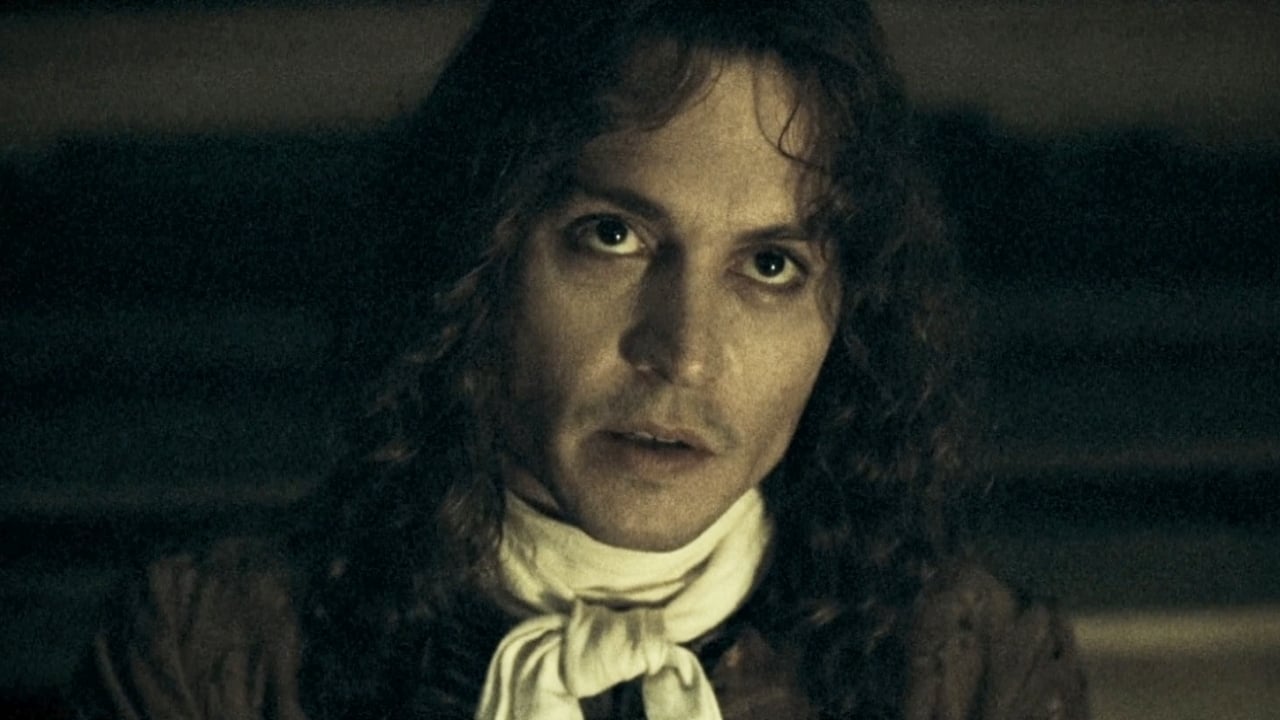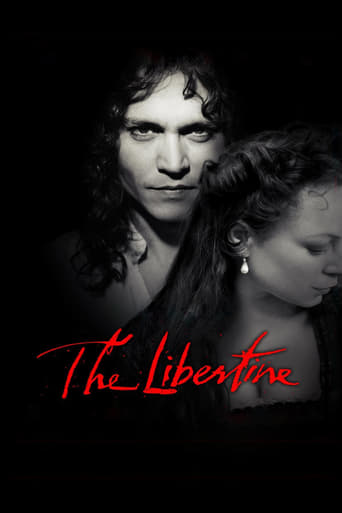Teringer
An Exercise In Nonsense
Afouotos
Although it has its amusing moments, in eneral the plot does not convince.
Phillipa
Strong acting helps the film overcome an uncertain premise and create characters that hold our attention absolutely.
Smoreni Zmaj
The story of John Wilmot, the Earl of Rochester, playwright and poet of the 17th century, the man who led a bohemian life to the extreme and drove himself to early grave at 33. This role brought Johnny Depp award for the most offensive male role (Women Film Critics Circle Awards) and there are also fantastic John Malkovich, funny Richard Coyle and beautiful Rosamund Pike. Sex, drugs and rock and roll in the manner of 17th century. :D8/10
begob
A likable character fails at every important thing. Then he dies.We start with a deceptive, dramatic monologue. The lead actor had not yet developed full-blown affectation, so his delivery is still interesting and engaging. And we have to root for his character because he's anti-establishment with an incisive line against hypocrisy.The love interest is great, with lovely performances by all the actresses, but especially in the stage-larnin' scene - I think you can see Depp lose his composure for a second when confronted with Morton's brilliance. The politics is done OK, although the set piece at the end is too stagey.I was confused by the story telling in the middle - took me a while to figure out he had syphilis - I'd assumed his disfigurement was down to being burned in the theatre fire. The death scene was good.The odd thing is that the beginning and end monologues are the reverse of what I felt: Do you like me? No, not really - I preferred you before you failed.It looked good to me, no complaints about lighting. And another IDMber is right - needed more Purcell and Handel on the soundtrack, less piano.Finally, no idea why this is rated 18.
jaybour1
As an actor and director, I am constantly amazed at the laziness of many actors vis-à-vis researching their roles. (For example, there are innumerable instances of actors who blithely commit major grammatical errors when they're supposed to be playing erudite language professors - e.g., "between you and I" instead of the correct "between you and me.") In THE LIBERTINE, which takes place in the 17th century, Johnny Depp, when using the word "flaccid," pronounces it "flassid." Now, any actor worth his salt would have researched the etymology of this word and discovered that the pronunciation of the word among the literati throughout the 17th century was always "flaksid." It was only in the 19th century that the alternate pronunciation, regrettably, came into vogue. Depp's error occurred early in the film and basically ruined the experience for me because I could no longer take him seriously as the literate poet and wit, John Wilmot. Do your homework, Depp!
classicalsteve
"You will not like me," Depp as John Wilmot, 2nd Earl of Rochester, states at the beginning of the film. This story is about the issue of actors and playwrights being either liked or disliked on and off the stage. Although the events take place in the late 17th century, the issues about acting and performance are the same as they are today. The audience will either love you or hate you. There is little in between.For 10 years, from 1649 to 1660, England and Scotland became a Republic under the Puritan leadership of Oliver Cromwell. The theaters were closed, gambling banned, drinking discouraged, and Bible study became mandatory. (However opera did continue.) Sort of the 17th-century equivalent of the southern Bible-Belt in the United States several centuries later.When Charles II became king and restored the throne in 1660, the Puritan restrictions were lifted. The theaters were reopened along with the brothels and the ale houses. As a result the country's libido went sort of wild. Sex, drinking, and gambling came back into vogue full force--things that make life worth living. Apparently, St James Park and other places in London became a hot spot for orgies that would give the bordellos of the 19th century a run for their money.This swinging of the "moral" pendulum toward a libertine sensibility manifested itself through the voices of playwrights and poets. Bawdy and risqué theater, poems and songs became all the rage and is often called "Restoration Comedy". No poet/playwright of the era was more bawdy and risqué than the young John Wilmot, 2nd Earl of Rochester. He led a double-life as a poet/playwright of Restoration Comedy but was also a member of the House of Lords."The Libertine" is a cinematic portrait of John Wilmot, 2nd Earl of Rochester, as the most liberated and uninhibited of the playwright-poets of the era, which also included the likes of John Dryden and George Etheridge. According to the film, Rochester doesn't just write risqué plays and poems. He lives the life of a sex-fiend and an alcoholic, constantly looking for sex and drink when he's not working at the theater. He is considered simultaneously brilliant and erratic; he is his own worst enemy as he neglects his duties as a nobleman. He was one of the few members of the House of Lords who commiserates with theater artists. He begins training a young woman in acting who is at first reviled by the audience at a performance. They then become lovers.Rochester is commissioned by his friend and patron, King Charles II, to write a spectacular play to impress ambassadors from France. But little does the king know that Wilmot's intentions are far from honoring his king. Behind the scenes, Wilmot trashes his sovereign and the entire institute of the monarchy, and he reveals that these opinions will be manifested in his work. During the performance in which the king and the French are in attendance, the ambassadors say his play (which I will not give away) would cause King Louis XIV of France to hang the playwright.Underneath the bawdiness of the era is a kind of somber undertone, a lack of depth of feeling and honesty which may be the main point of the film. Certainly, they threw off the shackles of Puritanism but also may have inadvertently put on a different kind of bondage, missing out on the comforts of love and fulfillment. The bawdy songs and the sex orgies are fun but have little to do with love and real relationships. The entire look of the experience is somewhat reminiscent of the darker filters used in the Godfather. Much of the landscape is probably relatively true to what the time and place was like. We still have the palaces, the music, the poems, and the books from the era. What we don't have are the strange mix of unease and monarchy in an era that was still trying to figure out what it wanted to be. Or do we? An incredible and underrated film.

